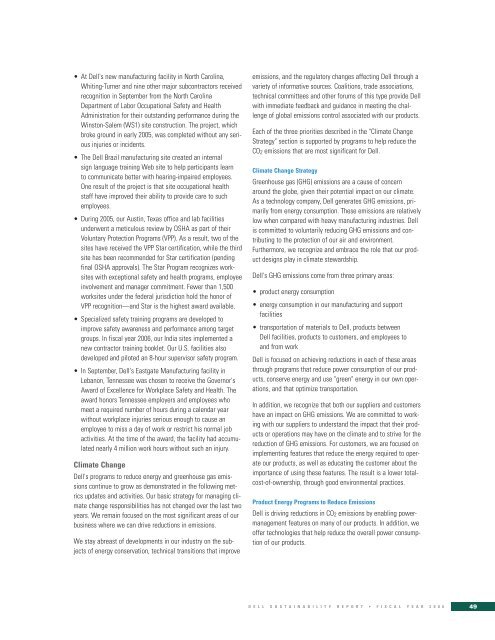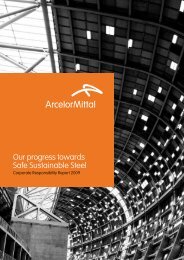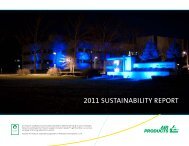Sustainability Report - Dell
Sustainability Report - Dell
Sustainability Report - Dell
Create successful ePaper yourself
Turn your PDF publications into a flip-book with our unique Google optimized e-Paper software.
• At <strong>Dell</strong>'s new manufacturing facility in North Carolina,Whiting-Turner and nine other major subcontractors receivedrecognition in September from the North CarolinaDepartment of Labor Occupational Safety and HealthAdministration for their outstanding performance during theWinston-Salem (WS1) site construction. The project, whichbroke ground in early 2005, was completed without any seriousinjuries or incidents.• The <strong>Dell</strong> Brazil manufacturing site created an internalsign language training Web site to help participants learnto communicate better with hearing-impaired employees.One result of the project is that site occupational healthstaff have improved their ability to provide care to suchemployees.• During 2005, our Austin, Texas office and lab facilitiesunderwent a meticulous review by OSHA as part of theirVoluntary Protection Programs (VPP). As a result, two of thesites have received the VPP Star certification, while the thirdsite has been recommended for Star certification (pendingfinal OSHA approvals). The Star Program recognizes worksiteswith exceptional safety and health programs, employeeinvolvement and manager commitment. Fewer than 1,500worksites under the federal jurisdiction hold the honor ofVPP recognition—and Star is the highest award available.• Specialized safety training programs are developed toimprove safety awareness and performance among targetgroups. In fiscal year 2006, our India sites implemented anew contractor training booklet. Our U.S. facilities alsodeveloped and piloted an 8-hour supervisor safety program.• In September, <strong>Dell</strong>'s Eastgate Manufacturing facility inLebanon, Tennessee was chosen to receive the Governor'sAward of Excellence for Workplace Safety and Health. Theaward honors Tennessee employers and employees whomeet a required number of hours during a calendar yearwithout workplace injuries serious enough to cause anemployee to miss a day of work or restrict his normal jobactivities. At the time of the award, the facility had accumulatednearly 4 million work hours without such an injury.Climate Change<strong>Dell</strong>'s programs to reduce energy and greenhouse gas emissionscontinue to grow as demonstrated in the following metricsupdates and activities. Our basic strategy for managing climatechange responsibilities has not changed over the last twoyears. We remain focused on the most significant areas of ourbusiness where we can drive reductions in emissions.We stay abreast of developments in our industry on the subjectsof energy conservation, technical transitions that improveemissions, and the regulatory changes affecting <strong>Dell</strong> through avariety of informative sources. Coalitions, trade associations,technical committees and other forums of this type provide <strong>Dell</strong>with immediate feedback and guidance in meeting the challengeof global emissions control associated with our products.Each of the three priorities described in the "Climate ChangeStrategy" section is supported by programs to help reduce theCO 2 emissions that are most significant for <strong>Dell</strong>.Climate Change StrategyGreenhouse gas (GHG) emissions are a cause of concernaround the globe, given their potential impact on our climate.As a technology company, <strong>Dell</strong> generates GHG emissions, primarilyfrom energy consumption. These emissions are relativelylow when compared with heavy manufacturing industries. <strong>Dell</strong>is committed to voluntarily reducing GHG emissions and contributingto the protection of our air and environment.Furthermore, we recognize and embrace the role that our productdesigns play in climate stewardship.<strong>Dell</strong>'s GHG emissions come from three primary areas:• product energy consumption• energy consumption in our manufacturing and supportfacilities• transportation of materials to <strong>Dell</strong>, products between<strong>Dell</strong> facilities, products to customers, and employees toand from work<strong>Dell</strong> is focused on achieving reductions in each of these areasthrough programs that reduce power consumption of our products,conserve energy and use "green" energy in our own operations,and that optimize transportation.In addition, we recognize that both our suppliers and customershave an impact on GHG emissions. We are committed to workingwith our suppliers to understand the impact that their productsor operations may have on the climate and to strive for thereduction of GHG emissions. For customers, we are focused onimplementing features that reduce the energy required to operateour products, as well as educating the customer about theimportance of using these features. The result is a lower totalcost-of-ownership,through good environmental practices.Product Energy Programs to Reduce Emissions<strong>Dell</strong> is driving reductions in CO 2 emissions by enabling powermanagementfeatures on many of our products. In addition, weoffer technologies that help reduce the overall power consumptionof our products.D E L L S U S T A I N A B I L I T Y R E P O R T • F I S C A L Y E A R 2 0 0 649
















